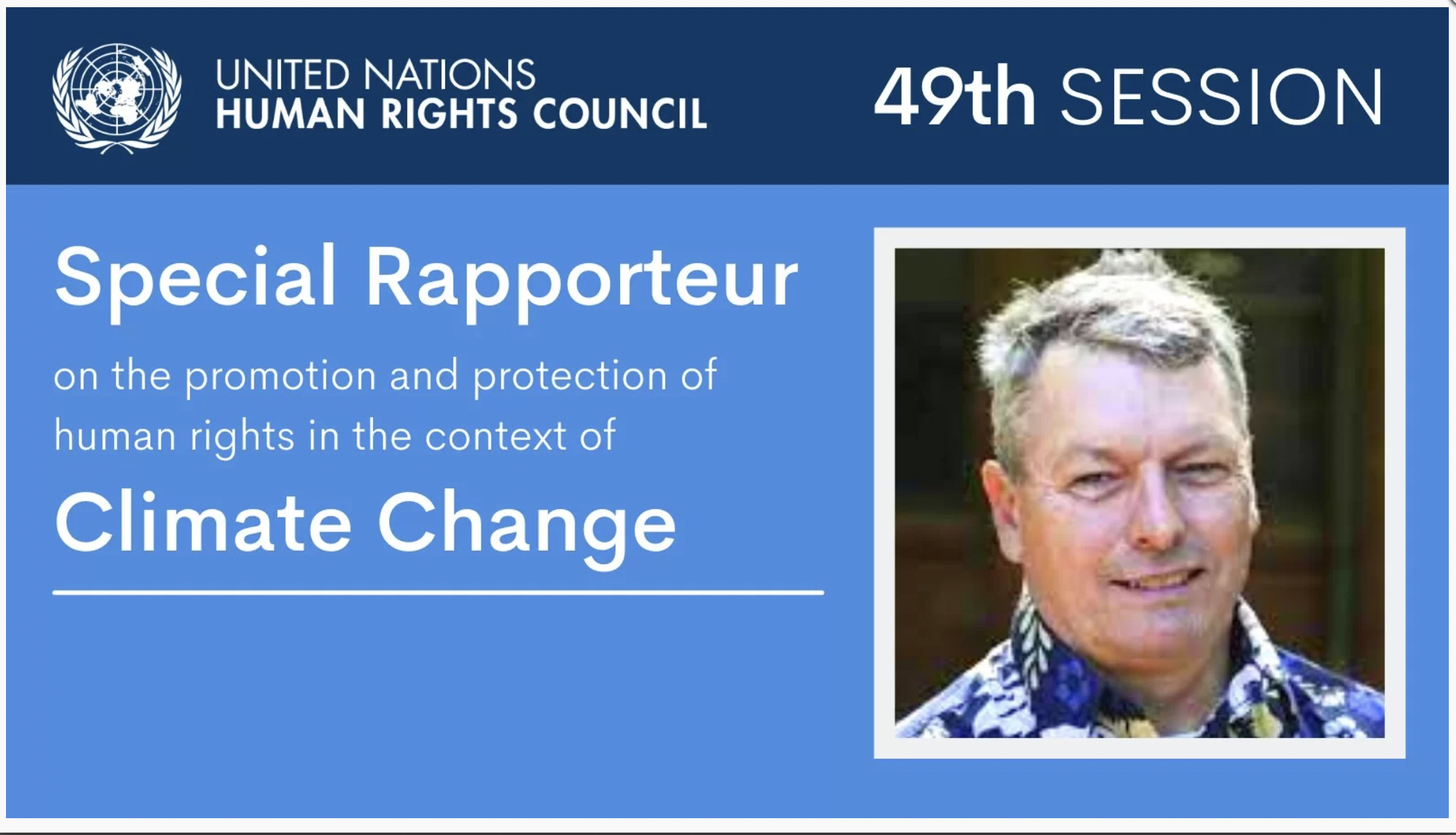
THE IMPORTANCE OF THE APPOINTMENT OF THE FIRST UN SPECIAL RAPPORTEUR ON HUMAN RIGHTS AND CLIMATE CHANGE
Ian Fry, an international environmental law and policy expert, is the first Special Rapporteur on the Promotion and Protection of Human Rights in the Context of Climate Change of the United Nations. He was appointed by the Human Rights Council at its 49th session in March 2022 and began his mandate on 1 May 2022.
His nomination is the result of 12 years of advocacy by numerous states in the global south and civil society organisations, including the Climate Vulnerable Forum, the Permanent Mission of the Marshall Islands and Bangladesh in Geneva.
Why was it necessary to have a Special Rapporteur on Rights and Climate?
A Special Rapporteur is an independent expert working on behalf of the United Nations (UN) under the ‘special procedure’ mechanisms of the UN Human Rights Council. His role is to investigate, monitor and recommend solutions to human rights issues in specific areas, in Fry’s case, his mandate focuses on the intersectionality of human rights and climate change.
It is well established that climate change threatens the ensuring of a wide range of human rights, including the right to life, food and health. The paradox is that measures taken to counter climate change can have – and in many cases already had – negative impacts on people and ecosystems. Given the severity of the current climate crisis, it is therefore essential to have an independent advocate for integrated action who advocates for sustainable development, the Paris Agreement and the UN Framework Convention on Climate Change, but at the same time ensures the promotion, protection, realisation and enjoyment of human rights by all.
How did this come about?
States and international institutions gradually recognised the complex relationship between climate change and human rights and, over the years, devoted more and more resources to the creation of international instruments that would lead to their protection through human-centred climate action.
Between 2008 and 2021, the UN Human Rights Council adopted 11 resolutions on human rights and climate change, while the UN Special Rapporteur on Human Rights and the Environment issued two dedicated reports on the same issue in 2016 and 2019. Meanwhile, the UN Climate Negotiations continued, and the Office of the High Commissioner for Human Rights presented a series of submissions under the Warsaw International Mechanism on Loss and Damage and the terms of reference of the Green Climate Fund’s independent repair mechanism. In 2011, Parties involved in the negotiations began to recognise the intersectionality between human rights obligations and climate change, leading to the conclusion of the Paris Agreement in 2015, the first international climate and environment treaty to mention human rights obligations in the preamble explicitly.
The latent risk in climate projects and programs is that in the name of reducing emissions, actions harmful to people and ecosystems are enacted, which is why it is crucial that human rights principles are embedded within these practices as social and environmental safeguards. For this reason, the recognition of the human right to a healthy environment formally sanctioned on 5 October 2021 with Resolution 48/23, and the subsequent creation of the new UN Special Rapporteur on Human Rights and Climate Change with Resolution 48/27 of 13 October 2021, can be seen as the final step in a process that aims to consolidate an intersectional approach to climate action and human rights protection.
What to expect?
During his term of office, the Special Rapporteur on Rights and Climate will provide recommendations on how to address and prevent the negative effects of climate change on the enjoyment of human rights and how to strengthen the integration of human rights principles into climate policy-making and legislation, which is key to achieving an equitable transition from fossil fuels to renewable energy sources and sustainable societal models. In his activities, the new rapporteur will coordinate with the current Human Rights and Environment Rapporteur David. R. Boyd, defining the scope of an intersectional approach between human rights, environment and climate.
It should be emphasised that Frye’s appointment is the product of the relentless advocacy work of organisations part of civil society that, with the support of several countries in the global south, have continued to lobby to balance the lack of accountability and ambition that plague environmental governance at the national and international level. This is certainly a positive sign, but it will have to be coupled with a renewed political will and commitment to multilateral cooperation in order to see tangible results, a real systemic action that is now dramatically necessary given the very short-term deadlines set by the sixth report of the United Nations Intergovernmental Panel of Experts on Climate Change (IPCC).
Chiara Soletti
Published online for Italian Climate Network on the website of the organisation.
